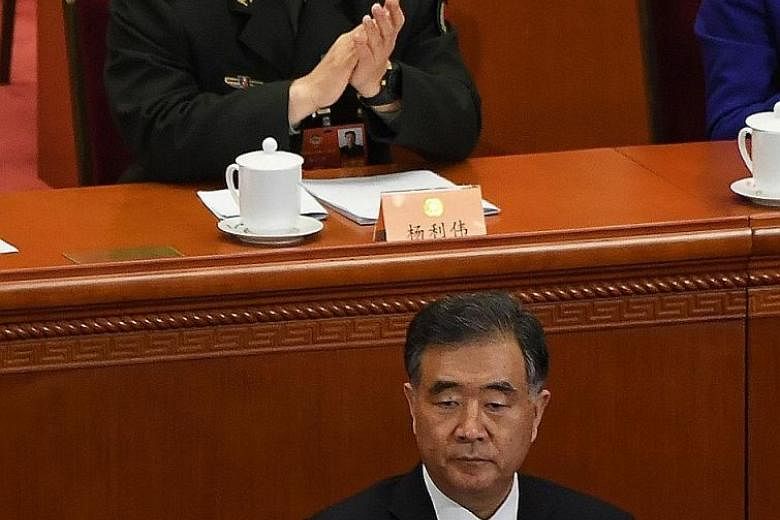Vice-Premier Wang Yang, who is a member of the Chinese Communist Party's apex Politburo Standing Committee, yesterday was unanimously elected chairman of the Chinese People's Political Consultative Conference (CPPCC), the nation's top advisory body.
Mr Wang's duties as the CPPCC chairman include overseeing cross-strait ties with Taiwan and dealing with affairs related to religious groups and ethnic minorities in China. All 56 ethnic groups in China are represented in the CPPCC.
The political advisory body, which meets yearly to debate issues and advise the legislature, is made up of political parties, organisations and independent members.
There was not a single dissenting vote against Mr Wang in the poll at the annual session of the CPPCC. He received all 2,144 votes cast, higher than the 99.7 per cent that outgoing CPPCC chairman Yu Zhengsheng garnered in 2013.
The 63-year-old Mr Wang is ranked fourth in the leadership hierarchy following his elevation to the Politburo Standing Committee during the 19th Party Congress in October last year.
He is aligned with Premier Li Keqiang and former president Hu Jintao, who belong to the Communist Youth League.
Mr Wang had been active in foreign affairs during his five-year tenure as vice-premier from 2013, often accompanying Chinese President Xi Jinping or Premier Li on overseas trips.
Last July, he led the Chinese delegation to the first United States-China Comprehensive Economic Dialogue held in Washington.
Before taking on his role at the State Council or Cabinet, Mr Wang was the party boss of Chongqing municipality and economic powerhouse Guangdong.
He advocated a relatively liberal set of social, economic and political policies, known as the "Guangdong model", when he was in charge of the southern industrial province from 2007 to 2012.
This earned him a reputation of being a liberal and a reformer.
"Wang Yang is an icon of reforms within the (Chinese Communist) Party," said Hong Kong-based analyst Willy Lam.
"The overwhelming support that he received is a show of appreciation by the CPPCC delegates for this reformist image that he carries," Dr Lam told The Straits Times.
However, Dr Lam noted that the role of the CPPCC chairman traditionally does not hold much authority and it is not a position that has substantive powers.
While the unanimous vote was "highly significant", it would have no impact on politics, he added.
Twenty-four CPPCC vice-chairmen were also elected yesterday. They included former Hong Kong chief executives Tung Chee Hwa and Leung Chun Ying as well as former Macau chief executive Edmund Ho, who were all re-elected for another term.
The annual CPPCC session opened on March 3 and closes today. It runs alongside the annual session of the National People's Congress, which closes on March 20.

